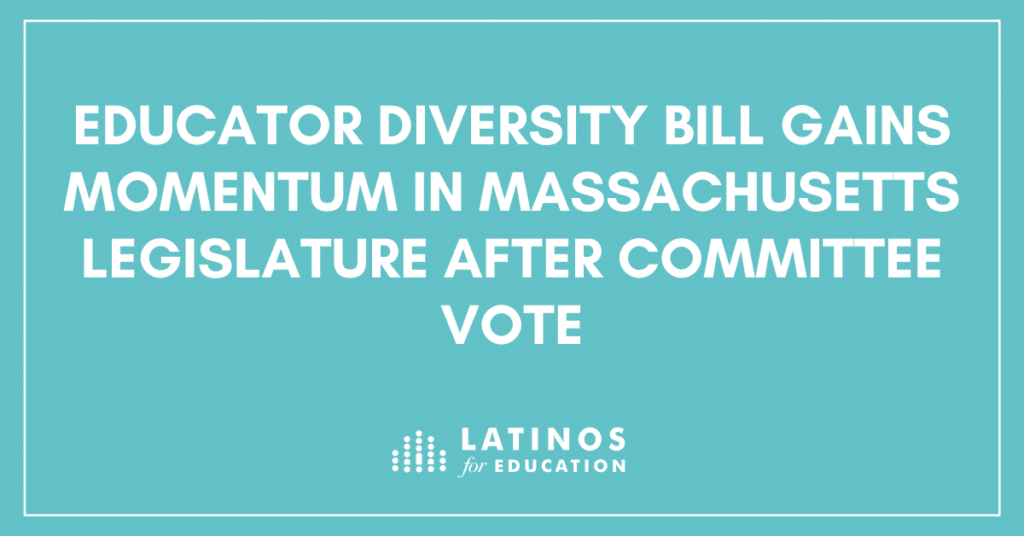
The Educator Diversity Act, led by Latinos for Education, was voted favorably out of joint education committee
Boston, MA – The Massachusetts Joint Committee on Education voted favorably in support of the Educator Diversity Act (H.682/S.366) sponsored by State Reprepresentative Alice Peisch and State Senator Jason Lewis, setting up the bill to be taken up for a vote by the legislature this year. Spearheaded by Latinos for Education and the Educator Diversity Act Coalition, this bill would tackle the lack of diversity within Massachusetts teaching workforce by addressing the barriers that prevent Black, Latino and Asian Pacific Islanders from entering the profession, the challenges that force educators of color out of the profession, and putting mechanisms in place for school districts across the state to prioritize and monitor educator diversity.
“The Department of Elementary and Secondary Education has made a commitment to have at least 26% of our state’s educator workforce be teachers of color by 2030. By offering concrete actions and innovative strategies, this bill would help move the state closer to that goal and help close the opportunity gaps that so many Latino students currently face in our education system because they don’t see themselves represented in their classrooms,” said Amanda Fernandez, Founder and CEO of Latinos for Education.
While 42% of all students in Massachusetts identify as students of color, only 10% of all teachers in the state identify as Black, Latino or API. That disparity is most prominent for Latinos who make up 22% of all students in the state, but only account for 5% of all teachers. Approximately 28% of students in Massachusetts attend schools where there are no educators of color.
“Representation matters, especially when it comes to education,” said Lorena Lopera, Executive Director of Latinos for Education, Massachusetts. “The data is clear that when students have teachers who share their experience and background, they are more likely to thrive. Unfortunately, too many Latino students currently don’t have that in their schools, and if we want to get serious about equity, we need to start with the diversity of who is teaching our kids.”
If approved by the Legislature, the bill will:
- Establish a pathway for alternative certification by 2024 so more educators of color can enter the profession. This includes diversifying the Career Vocational Technical Education educator pipeline.
- Create an educator diversity grant fund specifically targeted at programs and practices aimed at increasing educator diversity/retention.
- Create a statewide dashboard that collects and disaggregates data on hiring and retention by race and sets clear statewide targets for diversifying educator workforce.
- Direct DESE to create regulations, guidance, and policies aimed at prioritizing districts in which the disproportionately between students and educators of color is greatest.
- Require uniformity across school districts and public schools (including charter schools) to appoint diversity officers or teams to establish and implement DEI plans. It also establishes Educator Diversity Councils to inform the work of school committees.
- Require mandatory diversity training for the school committee, boards of trustees, district leaders, and all staff.
“Thanks to the leadership from Chair Peisch and Chair Lewis and the 63 members that have co-sponsored the Educator Diversity Act, we are on our way to establish a national model for how to address the lack of diversity within teaching all along the continuum from when someone decides to become a teacher to how they are supported to grow professionally and remain in the profession,” said Manny Cruz, Advocacy Director of Latinos for Education. “The COVID-19 pandemic has added additional stress and challenges to the educator workforce, so this is the perfect opportunity for the state legislature to address those challenges by prioritizing this bill.”
Massachusetts would become one of the few states to pass legislation specifically addressing the lack of educator diversity at a time when many educators of color are exiting the profession due to the COVID-19 pandemic.
“Increasing educator diversity plays a crucial part in racial justice and anti-racism work that is vital to providing a more holistic approach to student success here in Massachusetts,” said State Senator Jason Lewis, Senate Chair of the Joint Committee on Education. “I greatly appreciate the leadership and advocacy of Latinos for Education and other coalition members that are instrumental to the success of this important legislation.”
“Increasing diversity within the educator workforce is a critical part of improving education for all of our students across the Commonwealth,” mentioned Representative Alice H. Peisch, House Chair of the Joint Committee on Education. “Students who are taught by those representing the broadest range of cultures, identities, and backgrounds will benefit tremendously and achieve greater academic results. It has been a pleasure working with Latinos for Education and other stakeholders on this legislation, and I look forward to continuing this important work as the legislative session continues.”
“Diversifying our teacher workforce is truly about giving students the opportunity to excel in their education by encouraging students to bring their best selves to the classroom every day,” said State Representative Frank A. Moran. “The proposed funding mechanisms for the Educator Diversity Act will prioritize the diversification in the Gateway cities where it is needed most, and I will continue to work with my colleagues in the House of Representatives to ensure that this important bill is passed.”
“The Educator Diversity Act is addressing an immense need in our communities. Having diverse voices in the classroom is important, and will allow more students to feel included,” added State Representative Chynah Tyler, Chair of the Black and Latino Legislative Caucus. “I would love to see more Latino representation in classrooms, students need to see themselves and hear from educators that may have similar backgrounds.”
To learn more about the Educator Diversity Act or the Educator Diversity Coalition, please visit https://www.latinosforeducation.org/educator-diversity-act/
Media Relations Contact:
Nicole Murphy
[email protected]
256-425-1964





